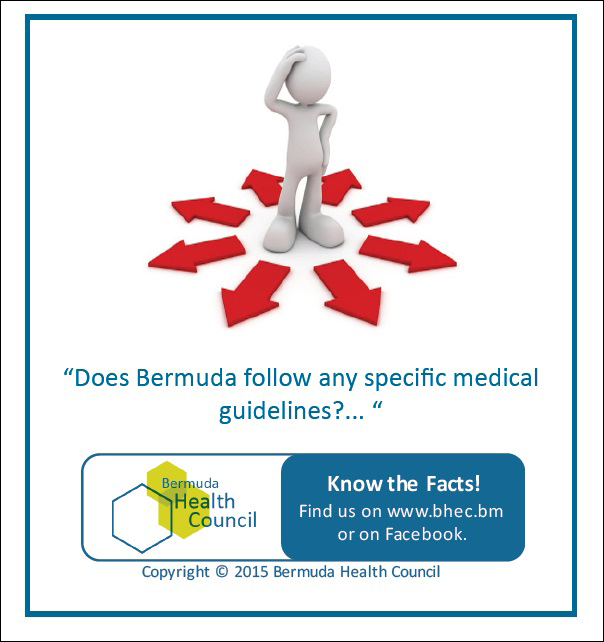BHeC: Clinical Guidelines & Your Medical Tests
The Bermuda Health Council and Bernews have teamed-up to answer your questions about the island’s health care system.
Visit www.bhec.bm to submit your queries and look for our response in Bernews on the first Wednesday of every month and on Bernews. Answers supplied by: Jennifer Attride-Stirling, CEO of the Bermuda Health Council
Question: I try to keep-up with the news and what medical tests I should have at a certain age, but it is very confusing. The US says one thing, the UK another. Does Bermuda follow any specific guidelines?
Answer: Keeping abreast of the latest science on healthcare can be tough for professionals, so your confusion is understandable. And with so much available on the Internet, it’s even harder to separate the good from the rubbish. Clinical guidelines are there to synthesize the latest research. Experts review scientific studies and summarize what is known to work best for most patients. Then individual physicians have to apply the guidelines to the needs of each patient. They’ve helped to raise standards and clarify expectations. There are many clinical guidelines available and, as you’ve seen, they can vary on some details.
However, there are many points of clarity. Bermuda developed its own guidelines for hypertension and diabetes some years ago. Implementing them across the board has been a challenge and keeping them up to date even harder. To make things easier, the medical community is looking at international guidelines to apply consistently in Bermuda. We’re starting with screening guidelines because prevention is so important. Right now we test aggressively for some conditions, but neglect screening for others. We need a better balance.
After looking at guidelines from the US, UK and Canada, there is growing consensus that the U.S. Preventive Service Task Force Guidelines offer a very helpful middle ground suitable for Bermuda. They are based on extensive studies, expert advice and are open to the public so anyone can see them. Use these as a starting point and then talk to your doctor about what’s best for you. You can find them online at uspreventiveservicestaskforce.org.
Question: I am so confused! I was told by one health provider that I needed a mammogram yearly because I am now 40 years old, but then my doctor told me that I don’t need one until I’m 50. Which one is right?
Answer: This depends on your medical and family history. Women with symptoms or who are at high risk [e.g. past diagnosis, immediate family member with breast cancer, etc.] should talk to their doctor to determine the best course of action. Your personal history, race and circumstances will determine what is best for you.
However, for most women with no symptoms or family history, standard clinical guidelines for screening mammography provide the right level of prevention. Such guidelines can vary between jurisdictions; ranging from: annually for women over 40, to every three years for women aged 50-70. This may explain the conflicting advice you’ve heard.
Bermuda is moving towards using international clinical guidelines by the US Preventive Services Task Force [USPSF]. They are based on extensive studies to balance the potential benefits and harms. For healthy women they recommend screening mammograms every two years between the ages of 50 and 74 years. However, the final decision about what is best for you personally should be made in consultation with your doctor. You can find the USPSTF guidelines at: link here
Read More About
Category: All



